Trading Day: Local market gains as currency war fears ease
A better-than-expected yuan fixing has allayed global fears of a currency war, helping the ASX higher.
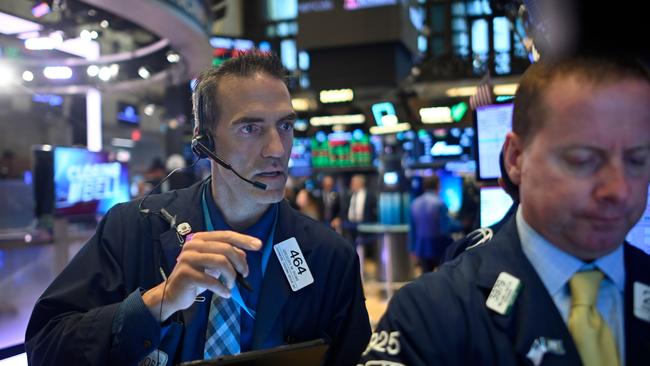
- APRA fines Westpac for late reports
- China trade data beats forecasts
- AGL slips after earnings hit
- Transurban returns to trade after $500m raise
- AMP revives life sale
That’s it for the Trading Day blog for Thursday, August 8. Local stocks reversed early losses after a better-than-expected yuan fix from the PBoC. AMP, AGL, Mirvac and Insurance Australia all released full year results this morning, with mixed reaction on the market.
David Swan 4.39pm: Suncorp’s Marlow jumps to Salesforce
Former Suncorp executive Pip Marlow, who announced her departure from the insurance firm yesterday, is joining CRM provider Salesforce as the company’s first Australia and New Zealand boss.
Ms Marlow will join the US tech giant from October, following two years at Suncorp and more than 20 at Microsoft.
“Pip is one of the most well-respected business leaders in Australia and New Zealand — we are thrilled to welcome her to Salesforce to lead us into the next chapter of growth and customer success in the region,” said co-CEOs Marc Benioff and Keith Block said in a joint statement.
“Pip brings a unique combination of industry experience, a strong focus on customer success and a deep commitment to our values.”
The executive departed Suncorp as part of a decision to axe the company’s digital marketplace strategy.
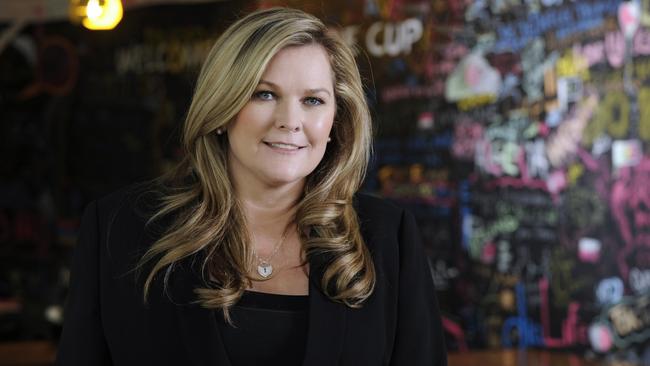
Samantha Bailey 4.25pm: Yuan fixing boosts ASX
After falling as much as 0.9 per cent in early trade on weaker-than-expected earnings, the local sharemarket staged a recovery to finish firmly higher as China fixed its yuan at its weakest since 2008.
The move by China’s central bank eased fears of worsening trade tensions, after US labelled China a “currency manipulator” earlier this week.
“The CNY Fix is the number one game in town and will continue to dictate the pace of play for risk assets over the near term,” VM Markets managing partner Stephen Innes said.
“Nothing else matters at this stage. Today signalled to investors that the People’s Bank of China is using market synergies drive the fix while trying to tame the beast by slowing the move higher, which has markets breathing a sigh of relief as this does signal an unwillingness to engage in a currency war while offering a trade truce gesture the US administration.”
Strength in the local market on Thursday followed a bout of risk aversion in global markets overnight which saw the S&P 500 briefly down 2 per cent overnight, while German and Australian bond yields hit fresh record lows and the price of gold above $US1500 for the first time in 6 years.
Rio Tinto lost 1.1 per cent to $88.52 as it traded ex-dividend, while Fortescue put on 4.1 per cent to $7.34.
BHP made 1.5 per cent to $37.30 after it announced it had approved funding to develop its oil and gas project in Trinidad and Tobago, which has estimated recoverable resources of 13.2 million barrels of oil and 274 cubic feet of natural gas.
In financials, Westpac edged up 0.1 per cent to $28.06 while NAB added 0.2 per cent to $27.73. Commonwealth Bank put on 0.3 per cent to $78.96, while ANZ underperformed its peers, losing 0.5 per cent to $26.81.
The Aussie dollar regained ground after a horror session on Wednesday, finishing up 0.21 per cent at US67.71c.
4.13pm: Stocks buck early weakness on Asia
The local market bucked early weakness thanks to regional strength, pushing the benchmark to a second day of strong gains.
Despite a strong lead from Wall Street, the local market slipped by as much as 0.87 per cent at the open, and came back as Asian markets came online.
By the close of trade, the benchmark ASX200 was higher by 0.75 per cent or 49 points to 6568.1.
The All Ords finished higher by 53.8 points or 0.82 per cent to 6642.3.
3.38pm: APRA fines Westpac for late reports
The bank regulator has slapped a $1.5 million fine on Westpac, along with subsidiaries St George Finance and Capital Finance Australia for repeatedly filing key reporting documents past their due date.
The Australian Prudential Regulation Authority says Westpac was 20 days late in filing its March reports, while the two others missed the same deadline by 37 days, with similar late lodgements for the month of April and March quarter.
APRA served the bank with a show cause notice in July, and after assessing Westpac’s response today proceeded with the issuance of infringement notices.
“Access to accurate and timely data is critical for APRA to monitor effectively the safety and stability of the banking, insurance and superannuation sectors,” APRA deputy chair John Lonsdale said in a statement.
“By issuing these infringement notices, APRA wants to send a strong message to industry that compliance with our reporting standards is mandatory, and cannot be considered secondary to other business priorities.”
Westpac has until September 6 to pay the fine.
2.47pm: Breville unlikely to disappoint: CS
Home appliance maker Breville is unlikely to disappoint in its upcoming results, even as the retail sector fights consumption weakness, according to Credit Suisse.
The broker raised the stock to Neutral, and lifted its target price to $16.44 per share from $12.59 previously noting the European rollout of the Sage brand as a key driver.
“We have upgraded our forecasts to assume that Sage is launched in another five countries over the next three years, and that when launched each country adds an incremental EUR$10m p.a. of sales,” analysts write.
“We forecast 10pc growth in our long-term forecasts for Europe. We have also upgraded our medium- term revenue growth assumptions for North America given Breville’s position
as a premium brand in this market.”
BRG shares are trading higher by 5pc to $18.52.
2.20pm: RBA needs to start signalling QE: RBC
As the RBA’s cash rate nears zero, it needs to start signaling that alternative policy measures like quantitative easing are available if needed, according to Royal Bank of Canada.
RBC Australia chief economist Su-lin Ong says that while further fiscal and monetary stimulus is likely before the RBA ventures down the QE path, more detailed public discussion of such unconventional policy is likely when the cash rate moves below 1pc.
“It needs to signal that there is further policy ammunition available as the official cash rate moves ever lower, that there is, effectively, no lower bound and that there are alternative measures if necessary,” Ms Ong says.
“This will help keep bond yields low, credit markets well supported, and assist asset markets.” She notes Governor Lowe’s speech in late July was a “step in this direction” as it confirmed a “lower for longer policy stance and clear easing bias”.
While noting that QE raises numerous questions including an over-reliance on housing, potential to refuel borrowing and debt, intervention in markets and misallocation of capital, she says the risks “need to be considered in the context of the alternative which is likely to be outright recession.”
Ms Ong puts the probability of QE adoption in the next three years at at least 30 per cent but sees “multiple challenges”, including the need to ensure that measures which lower borrowing costs for lenders are passed through to end household/business rates and also increases the volume of lending.
She feels targeted LTROs would have an advantage especially if there are no funding pressures and some desire to encourage lending outside of housing.
1.53pm: Chinese trade data beats forecasts
China has reported a trade surplus of $US45.06 billion, beating consensus of $US42.65bn with exports higher than anticipated.
In figures for July, China exports rose 3.3 per cent on the year before, versus an expected slip of 1 per cent and imports declined by 5.6pc versus a 9pc slip expected.
China’s Shanghai Composite will react to the data after it comes back from its lunchbreak, last up 0.91pc while the Hang Seng is higher by 0.55pc.
1.48pm: Yuan fix is the new VIX: Innes
The PBoC’s fix on the Chinese yuan is global markets’ new fear gauge, according to VM Market’s Stephen Innes.
In a note, he says the daily fix is dictating the pace of play for risk assets over the near term.
“Forget the VIX the fix, as in the Chinese yuan fix is the market’s new fear gauge as the USDCNH is now the best barometer for the market sentiment which after President Trump’s threat of more tariffs on China, is depressing at best,” he says.
“Today’s fix signals to investors that the PBoC is using market synergies drive the fix while trying to tame the beast by slowing the move higher, which has markets breathing a sigh of relief as this does signal an unwillingness to engage in a currency war while offering a trade truce gesture the US administration.”
After the fix was set better than expected today, the ASX has extended into positive territory, last up 0.4 per cent to 6547.8.
Perry Williams 1.21pm: AGL boss ‘not surprised’ by share slip
AGL boss Brett Redman said he was not surprised by the reaction of investors after its shares sunk by more than six per cent on disappointing 2020 earnings guidance.
“I’m not surprised because you get a sense of what people are saying shortly before you release your results, so we expect there is a little bit of disappointment in the outlook,” Mr Redman said. “It is clearly beneath consensus so that is not a surprise.”
AGL signalled a steep profit fall of up to 25 per cent in the 2020 financial year to a range between $780 million and $860m, with the $820m midpoint some 10 per cent below consensus of $908m.
The power giant is facing lower wholesale power prices and also needs to reprice new gas deals at higher costs than its legacy contracts.
Citi retained its sell rating based on the earnings contraction.
AGL shares last down 5.5 per cent to $18.90.
Joyce Moullakis 1.16pm: AMP life hopes ‘too good to be true’
Citigroup’s equity sales desk told clients AMP was announcing a “big shake up” but said the strategy change, capital raising and revised life insurance deal would lead analysts to further cut their future earnings estimates
Their note also said AMP’s expectations around the new life insurance deal and its timetable looked “a bit too good to be true”.
Macquarie Group analyst Brendan Carrig said: “In our view, at current levels the investment thesis is dependent upon the completion of the sale of AMP Life.”
His note to clients was titled ‘Everything but the kitchen sink?”
1.02pm: Lithium giant boosts local plays
A profit beat from lithium giant Albermarle and plans to curb production, are rubbing off on local plays, making them some of the best performers at lunch.
Shares in the US chemicals group jumped by 10 per cent in extended trading this morning, after raising its 2019 adjusted profit forecast and posting second-quarter profit of $1.45 per share, ahead of $1.43 forecast.
But the miner also said it was “delaying indefinitely certain lithium expansion projects”, set to ease oversupply fears.
That’s delivering a boost to Galaxy Resources, making it the top performer with a 6.55 per cent gain to $1.22 while Pilbara Minerals is higher by 6.35pc to 45.2c.
Albermarle’s takeover target Mineral Resources is up by 2.21 per cent, while Orocobre is higher by 5.86pc.
Nickel miner Western Areas is up by 4.5pc to $2.32 as demand for the fellow battery metal spikes.
ASX200 last at 6527.2.
Samantha Bailey 12.58pm: Tasmania a hurdle for Lion takeover
The Australian Competition and Consumer Commission has flagged competition concerns about the proposed acquisition of Tasmanian-based dairy business Lion by Canadian dairy giant Saputo.
The acquisition would combine the processing plants of Tasmania’s second and third biggest raw milk buyers, which currently compete separately with the biggest buyer, Fonterra.
“We are concerned that combining these two operators may lead to Tasmanian dairy farmers being paid lower prices for their raw milk,” said ACCC deputy chair Mick Keogh.
“If Saputo acquires the Burnie and King Island Lion plants, we will be left with a structure where two companies, Fonterra and Saputo, buy more than 80 per cent of the raw milk produced in Tasmania.”
12.34pm: Optus profit drops on 5G spend
Optus says its net profit was down 32 per cent to $105 million in the three months to June 30 as it invested in improvements to its mobile network.
Revenue was up 3.3 per cent to $2.25 billion while its earnings before interest, tax depreciation and amoritsation (EBITDA) was up 4.7 per cent to $687 million.
Optus chief executive Allen Lew said the company, a subsidiary of SGX-listed Singtel Group, had improved customer growth in the face of a “challenging competitive market”.
The telco said it was looking to add more subscribers to its sports streaming service, banking on its investment in exclusive sports content to contain the ongoing weakness in its core business.
AAP
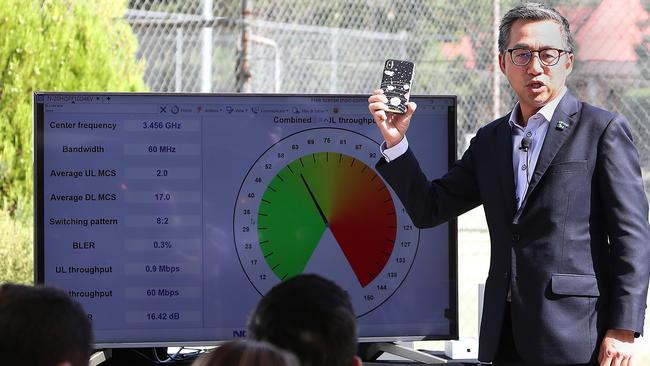
Mackenzie Scott 12.28pm: Retail boosts commercial sentiment
The retail sector experienced a boost market sentiment through the second quarter despite continued economic challenges, as overall sentiment towards the commercial property market grew.
NAB’s Commercial Property Index found that overall sentiment in the market lifted 9 points in the second quarter of the year to +7 points, correcting the previous quarter’s fall into negative territory.
Retail remained weak amid continued competition concerns and subdued household spending. Despite this, sentiment toward the sector improved 6 points in the second quarter to -38 per cent. The amount of available retail property to rent held broadly steady over the first half of the year at 5 per cent.
NAB analysts suggest the improvement may be linked to the economic security stemmed from the federal election and firming expectations around reserve bank rate cuts. Sentiment is expected to continue to improve over the next two years and outpace the falling CBD hotel sector.
Cliona O’Dowd 12.25pm: IAG tumbles on sluggish result
Shares in Insurance Australia Group have tumbled 5 per cent after it posted a sluggish result for the 2019 financial year and disappointed on its dividend payout.
For the 12 months through June, Australia’s largest general insurer posted a net profit of $1.076 billion, up 16 per cent on the prior year and above analyst expectations. But the result was propped up by the $200 million sale of its Thailand operations in August last year.
Cash profit for the year fell 10 per cent to $931m, missing analyst expectations.
The final divided payout of 20c per share also disappointed, coming in below expectations of 22.5c per share. The dividend will only be 70 per cent franked, unlike previous payouts, which were franked 100 per cent.
Shares in the insurer were down 5 per cent at $7.68 at midday.
12.10pm: ASX turns positive, tracking Asia
Australia’s sharemarket is tracking gains in Asia after a slightly firmer than expected Yuan fixing.
The S&P/ASX 200 rose 0.2pc to a 3-day high of 6534, after falling 0.9pc to a 2-day low of 6462.3.
Having bounced off 100-DMA support at 6459 for a third day, the index has now broken initial resistance from the May highs and June lows, in the 6511-6527 area.
A daily close near the current level would form a bullish hammer pattern, suggesting it could soon test more important resistance from the July low and 50-DMA, at 6627.
12.06pm: Treasury trims loss on short report
Treasury Wines has trimmed its earlier 8 per cent loss on its return to trade, after a damning short sell report prompted a halt on the stock this morning.
The winemaker says it will refer short seller GMT Research to the securities regulator after it filed a report alleging Treasury had manipulated its profits through accounting trickery.
A 7.7 per cent drop in the stock prompted a halt in trade, and the stock is now trading just 1.24 per cent lower at $16.35.
Treasury reaffirmed its earnings, to be reported next week, and said the report was “false” and “misleading”.

11.52am: Safe haven demand bad for equities
Ongoing strong demand for safe havens like bonds, gold and Japanese yen is a bad sign for risk assets like equities.
Australia’s S&P/ASX 200 share index is flat after after an early 0.9pc fall to retest 100-day moving average support at 6459.
Share markets in Asia are up, with China up 0.7pc, Japan up 0.5pc, and S&P 500 futures up 0.2pc after a slightly stronger-than-expected CNY fixing.
Australia’s 10-year bond yield is flat after falling almost 3bps to a new record low of 0.933pc as the global bond market rally continued overnight.
US 10-year Treasury yields rose more than 3bps to 1.734pc after a weak 10-year bond auction, after hitting a 3-year low of 1.5931pc intraday.
Moreover, bond yields in other yet markets continued to drop, with German 10-year bund yields ending down 5bps at -0.58pc after hitting a record low of -0.61ps after weak German industrial production data.
Despite intensified domestic rate cut speculation which now sees the market pricing in a 0.40pc RBA cash rate in 12 months time, the Australian yield curve continues to flatten.
Australia’s 3-10 bond yield spread is now hovering around 27bps - the flattest yield curve since 2011.
Meanwhile spot gold is hovering around $US1,500 after breaching that level for the first since since 2013.
Japanese yen remains strong with USD/JPY at $106.30 after hitting a 7-month low of JPY105.50.
Paul Garvey 11.42am: Chevron CO2 initiative starts operation
Chevron’s controversial $2.5 billion initiative to store carbon dioxide deep beneath Western Australia’s Barrow Island has finally started operation.
The carbon dioxide injection project, the largest of its kind in the world, was originally scheduled to start in March 2017 but has been beset by a series of persistent technical issues.
The US energy giant this morning confirmed that the project, which will cut the carbon emissions out of Chevron’s Gorgon LNG project by around 40 per cent, had started injecting carbon dioxide into rocks more than two kilometres beneath Barrow Island.
Chevron Australia managing director Al Williams said the company would steadily ramp up injection over the coming months.
“This achievement is the result of strong collaboration across industry and governments and supports our objective of providing affordable, reliable and ever-cleaner energy essential to our modern lives,” Mr Williams said in a statement.
The company expects to inject around 100 million tonnes of carbon dioxide back underground over the life of the project.
11.28am: Yuan fixing lowest since ‘08
The People’s Bank of China has fixed the yuan at 7.0039 against the dollar, the first time above 7 since 2008.
Still, thats stronger than consensus of 7.0156.
11.12pm: CBA valuation has run too far: Citi
Commonwealth Bank core earnings were disappointing, but yesterday’s share price reaction was surprisingly mild especially accounting for its valuation, so says Citi’s Brendan Sproules.
In a note to clients, he says the bank’s valuation is too high and its premium to peers is unjustified, with trade at 15x FY20.
“There is a risk that the sizable premium to peers closes over the next 12 months, in our view,” Mr Sproules says, noting that the year ahead will be very different to the one past.
“The muted share price reaction can be attributed to better FY20 prospects compared to the FY19 result. Lending momentum has returned, NIMs can remain flat and compliance costs will remain, but are unlikely to continue growing.”
He expects a $5 billion buyback to be announced during the year as divestments complete, with pending NZ capital changes unlikely to be an impediment.
Citi maintains a Sell on the stock, with a price target of $73.25.
CBA last traded lower by 0.98 per cent to $77.93.
11.08am: Nikkei flat after opening boost
Tokyo’s key Nikkei index has given up early gains on Thursday, as investors hunted for bargains after four days of losses driven by concerns over trade tensions between the United States and China.
The Nikkei 225 index rose 0.30 per cent in early trade, but has backtracked by 0.13 per cent in the second hour.
That adds to a more than 1,000 point loss in its four-day losing streak to Wednesday.
“Japanese stocks are now looking underpriced and likely to resist falls,” Okasan Online chief strategist Yoshihiro Ito said in a note.
But investors were staying away from active buying with the safe-haven yen remaining strong amid US-China trade tensions, raising worries about Japanese exporters’ earnings.
AFP
Supratim Adhikari 10.32am: Ellis to lead MYOB after takeover
Accounting software maker MYOB boss Tim Reed is stepping down, with former Realestate.com.au CEO Greg Ellis set to take his place.
Mr Reed, who had a 12-year stint as MYOB’s CEO, is stepping down within months of the company being bought by private equity heavyweight Kohlberg Kravis Roberts (KKR).
The $2 billion deal has seen MYOB delist from the stock exchange, with the company saying that it would be better placed to grow under private ownership.
Mr Reed will vacate the position in September but will remain with MYOB as an advisor.
He said that MYOB was ready to take the next step in its transition from a provider of desktop solutions to a cloud-based subscription software business.
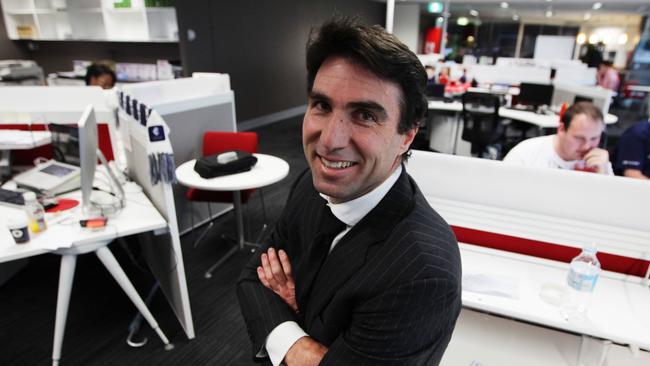
10.26am: Rural Funds surges on return
Rural Funds Group, the subject of a scathing short attack earlier this week, has surged by 27 per cent on its return to trade afer rejecting allegations and defending its business model.
The stock had 42 per cent of its market value wiped on Tuesday, after the report was released suggesting it was in breach of loan covenants and suggsesting its equity was “worthless”.
Today, the stock is up 27 per cent to $1.73, though still off its $2.35 close on Monday.
10.19am: Stocks take bigger than expected hit
The local market has taken a larger-than-expected tumble at the open, weighed down by losses in Utilities and banks stocks.
Futures were pointing to a 0.1 per cent slip, especially given US positivity, but the market has slipped as much as 0.7 per cent early to 6462.3.
Continued selling in Commonwealth Bank, after its results yesterday, is taking the most points off the market, while Transurban shares are down 1.77 per cent on its return to trade after a raise and its results yesterday too.
Rio Tinto and BHP are down 3.39 per cent and 0.14 per cent respectively, after iron ore slipped below $US93 per tonne overnight, with BHP buoyed by its newly announced investment increase in the Ruby oil and gas project.
ASX200 last at 6481.1.
Perry Williams 10.06am: AGL slips after earnings hit
AGL Energy shares have slipped by 4 per cent at the open after flagging a steep fall in its 2020 earnings as an outage at its Loy Yang coal plant combined with lower electricity prices and higher fuel costs dampen the outlook for Australia’s largest power supplier.
After announcing annual underlying profit after tax for 2019 of $1.04 billion, just beating a consensus estimate of $1.01bn, AGL signalled a steep profit fall of up to 25 per cent this year to a range between $780 million and $860m.
That guidance at the $820m midpoint is 7 per cent lower than RBC’s forecast of $881m.
Along with the plant, price and cost hits it also blamed higher depreciation following a hike in capital and the re-regulation of retail standing offers which also hit rival EnergyAustralia’s half-year earnings on Tuesday.
AGL shares opened 4.6 per cent lower at $19.08, last down 3.95pc at $19.21.
Ben Wilmot 9.58am: Rural Funds rejects short allegations
Traders will be closely watching the progress of Rural Funds Group as it starts trading after the extraordinary attack made by short-selling outfit Bonitas Research that led to $335 million being stripped off the company on Tuesday morning.
Shares in under-fire agricultural landlord Rural Funds Group will start trading at 10am today with its manager telling investors in a webinar this morning that it completely rejects allegations made by Bonitas.
The listed group’s shares plunged by 44 per cent on Tuesday and it has since been in trading halt after the damning report, that claimed trust manager Rural Funds Management, conducted nefarious transactions and the listed group’s valuations were overstated.
But RFF managing director David Bryant today said that he and other RFF staff would be in the market buying stock and that the listed trust, that owns about $920m worth of agricultural assets, was not in breach of loan covenants, as Bonitas asserted, and it had the support of its banks.
Mr Bryant added the listed group remained on track to hit its guidance and would report in three weeks. He said the accounts would be inspected by Ernst & Young and asked investors to take comfort from the fact that RFF was inviting in the independent expert to check it books.
RFF conceded that an accounting error had been made in one cell in the notes to its accounts but said that this did not flow through and was not an issue.
Asked whether RFM would pursue Bonitas if the allegations it had made were false Mr Bryant said that that was the least of the company’s concerns today.
“In time we will consider our options,” he said, but he warned the possibilities of action may be remote as Bonitas is out of jurisdiction for local defamation and corporations laws.”
Andrew White 9.52am: Byres turns criticism back on industry
APRA chairman Wayne Byres has admitted mistakes in supervising the finance sector but turned the criticism back on industry, calling for a revival of self regulation to restore trust.
In a speech this morning Mr Byres said it was up to the industry, company and individuals to better regulate their own conduct with a focus on what was right rathar than what it could get away with.
“While after-the-event punishment will act as a general deterrent against illegal behavior, more than just compliance with the law is needed to restore the financial sector’s reputation,” Dr Byres told the Banking and Finance Oath Summitt.
“Individuals, companies and industries must better regulate their own behaviour: to do not only what is legal, but also have regard to what is right.”
The comments in a speech to the Banking and Finance Oath conference in Sydney, come just weeks after a review led by former competition regulator Graeme Samuel last month found the Australian Prudential Regulatory Authority was secretive, slow to respond and out of step with community expectations.
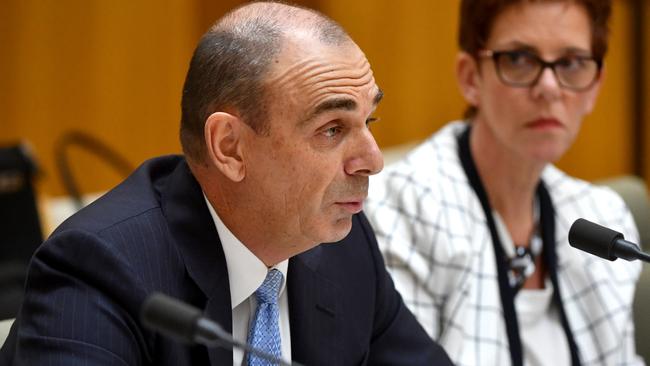
Samantha Bailey 9.49am: Lendlease hit with 2nd class action
Construction giant Lendlease has been hit with a second class action alleging the group misled the market and failed to adequately disclose problems with its troubled engineering division.
The proceeding, filed by Phi Finney McDonald, is being prepared on behalf of security holders who acquired an interest in Lendlease’s stapled securities or American Depositary Receipts between October 17, 2017 and February 25 this year.
It follows a similar class action by Maurice Blackburn filed on April 18.
9.43am: Iron ore squarely in bear territory
Iron ore has continued its move lower, now squarely in bear market terrritory as prices fell below $US93 per tonne overnight on weak buying interest in China.
“Uncertainty over the impact of rising US-China trade tensions on downstream demand and the yuan has weighed heavily on iron ore prices,” CBA mining and resources analyst Vivek Dhar says.
“While the price falls in iron ore over the last week are too large and too quick to be fundamentally-driven, the downward momentum will be hard to stop.”
Those moves will likely weigh on key bulk miners BHP, Rio Tinto and Fortescue in today’s trade.
9.32am: What’s impressing analysts, what’s not
- A2 Milk started at Overweight, target price $5.79 - JP Morgan
- ARB cut to Neutral, price target cut 10pc to $18 - Macquarie
- Bellamy’s rated New Neutral - JP Morgan
- Breville raised to Neutral - Credit Suisse
- Centuria cut to Hold - Moelis
- Commonwealth Bank target price cut 1.8pc to $77.60 - Credit Suisse
- Suncorp raised to Buy - Bell Potter
- Transurban price target raised 6.6pc to $13 - Credit Suisse
9.29am: Stocks to dip despite US recovery
The local market is set to slink lower in Thursday’s session, despite a boost on Wall Street as company earnings releases pile in.
Futures relative to fair value suggest an early decline of 0.1 per cent, but futures suggest some upside risk, currently pointing to a 0.1 per cent gain.
Overnight, Wall Street recovered from its trade war fuelled sell-off earlier in the week, led by gains in tech stocks with the Nasdaq closing up 0.4 per cent.
US President Donald Trump stepped up his assault on the Federal Reserve, calling for the FOMC to cut rates bigger and faster, a call that comes amid a surprise 50 basis point cut from the RBNZ.
The Aussie dollar made back some ground after plunging to decade-lows yesterday on that decision, but pressure will remain over the session ahead.
“The spread between 3-month Treasury bill rates and 10-yr yields, a widely watched recession indicator, increased to the highest level seen since March 2007,” ANZ economist David Plank says summarising key moves overnight.
“US Treasury 30-yr yields neared record lows and yields on German 10-yr government bonds fell to a new low of -0.6 per cent. Oil prices slumped 4 per cent to $US51.5/bbl, a seven-month low.”
Iron ore too has extended its losses, now firmly in bear market territory with prices at $US93 per tonne.
Locally, earnings from AMP, AGL, Mirvac and IAG will put pressure on those shares while RBA assistant governor for financial systems Michele Bullock is speaking on financial stability through the lens of business this morning.
China trade data is expected alter this morning.
ASX200 last at 6519.5.
Eli Greenblat 9.27am: Kathmandu headed for record profit
Outdoor adventurewear retailer Kathmandu has confirmed it is heading for a record profit for fiscal 2019 despite cycling a very strong winter sales period last year and difficult trading conditions in New Zealand.
The retailer has also benefited from continued solid trading from its newly acquired North American footwear group Oboz.
In a trading update to the market this morning the company said based on unaudited results for 2019, it was expecting total sales of $NZ545 million, up 9.6 percent on fiscal 2018 and same store sales growth of 0.6 per cent at constant exchange rates.
Australia same store sales were up 2.7 per cent. New Zealand same store sales fell 3.9 per cent.
9.21am: Transurban returns to trade after $500m raise
Transurban has completed its $500 million raise to institutional investors, paving the way for it to take full control of the M5 West toll road.
Unveiling its results yesterday, Transurban said it was acquiring the remaning 35 per cent stake in the toll road it did not own for $468 million, to be funded by an institutional placement and share purchase plan.
Today, it said the placement was strongly supported at a price of $14.70 apiece, at a 3.48 per cent discount to its last trading price of $15.23.
Shares in the company will return to trade today, with the company’s profit drop likely to weigh.
9.14am: China exporter buys formula maker
China-focused exporter JAT Energy is making a move into the lucrative infant milk formula sector, this morning unveiling its acquisition of a 70 per cent stake in manufacturer Australian Natural Milk Association (ANMA).
The deal, worth $12 million in cash and $2 million in JAT shares, will be staged in six tranches until June 30, 2020 and gives the exporter control of the supply chain of one of its major products.
ANMA already has key Chinese regulatory approvals, and gives JAT the opportunity to sell its in-house brands into the Chinese markets.
9.08am: Nick Scali warns of negative growth
Furniture retailer Nick Scali has warned of negative same store sales growth to start the September quarter, but said it still swung to a record profit over the full year.
Handing down its results this morning, the retailer posted net profit after tax of $42.1 million, up 2.8 per cent on last year, alongside a 6.9 per cent boost to revenue.
But despite that, it said operating expenses were increasing thanks to wage and property costs and same store sales were flat for most of the year, with a slip to start the new year.
“As a furniture retailer, Nick Scali Limited is very dependent on housing sales and renovations which have been in decline, and trading conditions will likely only materially improve when there is an uplift in housing sales and renovations,” it said.
9.02am: BHP throws $418m at oil project
BHP has approved $US283 million ($418m) in funding to develop its oil and gas project in Trinidad and Tobago.
The Ruby project has estimated recoverable resources of 13.2 million barrels of oil, and 274 cubic feet of natural gas, with first production expected in 2021.
At its peak, BHP says the project will increase production by 16,000 barrels of oil per day, and 80 million standard cubic feet per day.
BHP is the operator, and holds a 68.46 per cent interest alongside Heritage Petroleum (20.13pc) and the National Gas Company of Trinidad and Tobago (11.41pc).
9.00am: AMP cuts CEO bonus potential by $4.6m
AMP has reduced chief executive Francesco De Ferrari’s potential bonuses by as much as $4.6 million to reflect the company’s diminished value since his appointment was announced.
Mr De Ferrari had been in line to receive $16 million worth of so-called buyout and recovery incentives, the latter dependent upon a recovery in the company’s shares, but the amount was based on a $3.44 share price ahead of his appointment a year ago.
AMP has adjusted the targets and incentives to reflect a share price decline to $2.45 just before he started in January, dropping the value of the buyout and recovery incentives to $11.4 million.
AAP
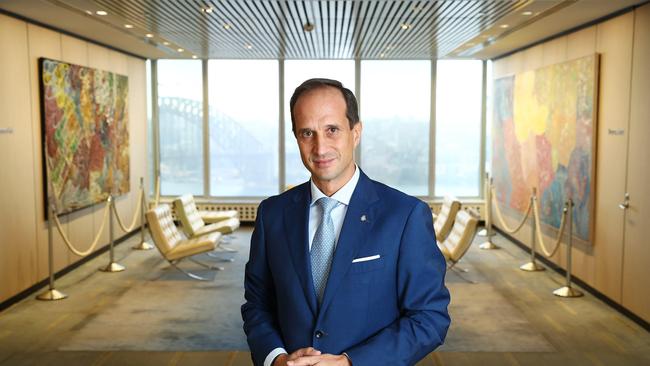
Samantha Bailey 8.52am: AGL profit slumps, buys Perth Energy
AGL has unveiled a full-year profit slump, as it announced the acquisition of Perth Energy as well as an on-market share buy-back.
Announcing a statutory net profit after tax down 43 per cent on the prior year to $905 million, chief executive Brett Redman said AGL planned to extend its safety net support affordability and reward loyalty program to gas customers.
The power giant also flagged a full-year underlying profit after tax of between $780m and $860m for fiscal year 2020, compared to an underlying after tax profit of $1.04 billion in 2019.
AGL’s board declared a final dividend of 64 cents per share, 80 per cent franked, up from 63c last year.
“It was a record year for capital expenditure, as we continued to increase investment in our existing generation fleet, progressed construction of the Barker Inlet gas-fired power station in South Australia for delivery in FY20 and delivered the final year of our Customer Experience Transformation program,” Mr Redman said.
8.35am: IAG lifts profit 16.6pc
Insurance Australia Group has posted annual net profit of $1.08 billion, up 16.6 per cent from $923m last year.
Revenue was $17.66bn, from $16.41bn.
IAG declared a final dividend of 20c.
8.30am: Mirvac profit falls
Mirvac Group said its annual net profit fell by 6 per cent, but residential sales held up and defaults were contained amid tough conditions for Australian property developers.
The Sydney-based company, which also owns shopping malls and develops residential communities, reported a net profit of $1.02 billion for the 12 months through June, down from $1.09 billion a year earlier.
Its operating earnings per share were 17.1 cents, in line with tightened guidance provided in May and extending its record of beating the midpoint of its initial annual profit guidance each year since the 2012 fiscal year.
Mirvac said it sold 2,611 residential lots during the fiscal year, slightly above recent guidance. Defaults were below 2 per cent and residential pre-sales totalled $1.7 billion at the end of June.
Dow Jones
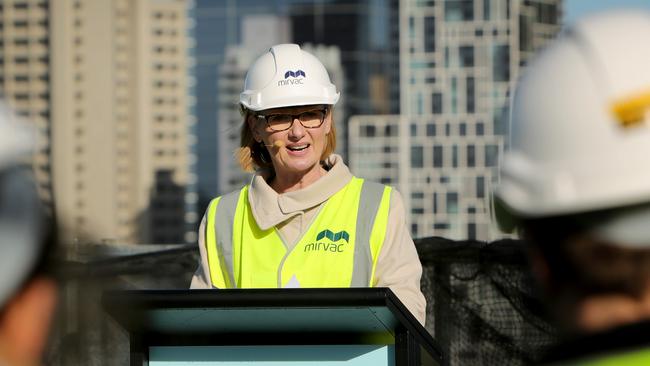
8.15am: Fees power Fox earnings
Gains in affiliate fees and retransmission consent revenue drove Fox Corp’s fiscal fourth quarter earnings, despite a downturn in advertising revenue and subscriber losses.
Fox Corp reported revenue of $US2.51 billion, up 5 per cent from the year-ago quarter and pre-tax income of $US656 million.
Adjusted earnings per share came in at 62 cents a share, down 7 per cent from the year-ago quarter. Both revenue and earningsper share came in slightly above analysts’ expectations. Net income for the quarter came in at $US454 million, down from $US471million.
Fox’s fiscal fourth quarter marks its first full quarter as a stand-alone entity following the sale of most of 21st CenturyFox’s assets to Disney, a deal that closed in March. Fox’s year-ago figures are estimates based on calculations as if the businesses had been operating autonomously within 21st Century Fox.
Reuters
Joyce Moullakis 7.50am: AMP revives life sale
Under-fire wealth group AMP has resurrected the sale of its life insurance business at a lower $3 billion price, and kicked off a $650 million heavily-discounted capital raising to shore up its balance sheet.
AMP’s transformation plans come as it delivered a $2.3 billion net loss for the six months ended June 30, according to documents lodged with the ASX on Thursday. That compares to a $115 million interim profit last year.
AMP said underlying profit for the first half printed at $309 million. Operating earnings tumbled 31 per cent as four of its five business units had lower results, bar real assets and infrastructure arm AMP Capital.
The capital raising will be conducted at $1.50 per share, or a 13.3 per cent discount to where the stock closed on Wednesday. It is a placement to institutional investors and a share placement plan.
AMP, led by Francesco De Ferrari, also outlined a $1 billion to $1.3 billion transformation plan to invest in growth, reduce costs and tackle legacy issues.
7.45am: Oil prices dive
Oil prices tumbled nearly five per cent overnight after an unexpected build in US crude stockpiles and on fears of slowing demand, but halved their losses in post-settlement trade on talk that Saudi Arabia was mulling options to halt crude’s descent.
Brent crude futures settled down $US2.71, or 4.6 per cent, at $US56.23 a barrel - the lowest close since early January.
Prices have lost 24.5 per cent since their 2019 peak in April. US West Texas Intermediate (WTI) crude futures finished $US2.54,or 4.7 per cent, lower at $US51.09.
Both benchmarks then traded more than $US1 higher than their settlement in the after-market, with Brent at $US57.42 a barrel and WTI at $US52.35. Traders said there were reports that Saudi officials were considering all options to stop the drop in oil prices and that they believe the fall has been caused by fears of an economic slowdown not an oversupply of crude. Oilprices fell early in the session on worries about the trade conflict, then extended losses after government data showed abuild of 2.4 million barrels in US crude stockpiles last week instead of the 2.8 million-barrel draw analysts had expected.
Reuters
7.40am: AGL buying Perth Energy for $55m
New Zealand infrastructure investment company Infratil has announced the conditional sale of Perth Energy to AGL.
Infratil says it expects to receive cash proceeds of approximately $55.0 million for its 80 per cent stake in Perth Energy.
As at March 31, Infratil’s book value for Perth Energy was $NZ89.3m, meaning the sale will produce a loss on disposal of $NZ33.0m. Infratil says it may receive further sale proceeds of up to $A14.9 million in cash within three years.
7.35am: Kathmandu set for record profit
Adventure clothing retailer Kathmandu says it’s on track for a record annual profit.
In a trading update, and based on unaudited results, it says it’s expecting total sales to rise 9.6pc to $NZ545m, same-store sales up 0.6pc, net profit of between $NZ55.5m and $NZ57m and EBIT of between $NZ82.5m and $NZ84m.
Kathmandu’s CEO Xavier Simonet said: “We were particularly pleased with the
second half performance in Australia given we were cycling strong growth in our key winter period last year. New Zealand conditions were challenging.
“Oboz, acquired in April 2018, continued to deliver strong sales and EBIT growth in 2H, with continued progress anticipated in FY2020 and beyond.”
Kathmandu releases its full-year results in late September.
7.20am: ASX expected to open lower
The Australian share market is expected to open lower after a mixed session on Wall Street.
At 7am (AEST) the SPI200 futures contract was down 11 points, or 0.17 per cent, at 6,438.0, suggesting an early dip for the benchmark S&P/ASX200.
On Wall Street overnight, the Dow Jones Industrial Average finished down 0.09 per cent, the S&P 500 was up 0.08 per cent and the tech-heavy Nasdaq Composite was up 0.38 per cent.
The Aussie dollar is buying US67.57 cents from US67.11 cents yesterday.
AAP
6.50am: US stocks recover from early swoon
Wall Street stocks finished little changed following a choppy session as a plunge in treasury bond yields early in the day underscored worries about a weakening global economy.
After a bruising start, US stocks gradually pushed higher throughout the day while Treasury yields recovered from their lows. Two of the three major indices finished in positive territory.
Decisions by Asian central banks to cut interest rates and weak German data “reminded investors that economic growth in severalother regions of the world remain at risk as the US and China trade dispute drags on,” said CFRA strategist Lindsey Bell in a note.
“While uncertainty is driving upside in defensive asset classes, we don’t think stocks should be abandoned at this time. A near-term recession is unlikely.”
The Dow Jones Industrial Average finished at 26,007.07, down 0.1 per cent but more than 560 points above its session low.
The broadbased S&P 500 added 0.1 per cent at 2,883.98, while the tech-rich Nasdaq Composite Index gained 0.4 per cent to 7,862.83.
After yesterday’s ASX rebound, Australian stocks are poised to open a little lower. At 6.45am (AEST) the SPI futures index was down 10 points.
US stocks have been under pressure in August as optimism over a Federal Reserve interest rate cut has been replaced by unease at US President Donald Trump’s latest tariffs on China and China’s response, which has included halting US agricultural purchases.
Banking shares were big losers as the weakening US interest rate outlook crimps the profit outlook. JPMorgan Chase, Wells Fargo and Bank of America all lost around two per cent or more.
Disney also had a bad day, losing 4.9 per cent after missing earnings forecasts. But CVS Health shot up 7.5 per cent as thepharmacy chain lifted its profit forecasts. The results also lifted rival Walgreens Boots Alliance, which gained 2.0 per cent.
AFP
6.42am: Iron ore falls again
The spot price of iron ore sank 5.2 per cent to $US92.80, according to CommSec.
6.40am: Companies baulk at latest Trump tariffs
The cost of President Donald Trump’s latest tariffs on Chinese goods will either be passed onto consumers, or taken from profits, several US companies said.
“The American people are being misled by this administration that China is paying for these tariffs. This is a tax on them, or on the businesses that are bringing products to America,” said Win Cramer, chief executive of Jlab Audio, a California company that makes headphones.
Cramer, who has suspended plans to hire more staff in light of the tariff threat, joined a conference call organised by “Tariffs Hurt the Heartland,” a campaign of trade organisations to a policy of a president who has referred to himself as “tariff man.”
The group released data showing US consumers paid $US6 billion in tariffs in June, up 74 per cent from the year-ago period.
AFP
6.35am: Investors seek safety in bonds
Money poured into the world’s bond markets as investors shunned riskier assets such as stocks for the relative safety of government debt.
Gold, another safe-haven favourite, rose to levels last seen six years ago. Official rate cuts from three central banks, including a surprisingly aggressive one by the Reserve Bank of New Zealand, served as a stark warning that a worsening US-China trade conflict is shaking confidence in global growth.
As bond prices surge, their yield or returns to investors fall, with benchmark 10-year government paper in the US and elsewhere dropping to multi-year lows.
French and German bond yields, already in negative territory, even set new record lows, highlighting how safety is now the first priority in the markets.
The US-China trade war is the main reason to worry about growth, analysts said, but the outlook for a no-deal Brexit is also weighing on sentiment.
Markets now believe that the world’s key central banks will cut interest rates further to stave off, or at least alleviate, any coming recession, analysts said.
US Treasury yields showed a fall of 0.102 percentage points on the day, outdone among developed economies only by New Zealand yields following the rate cut, and Italy.
Ten-year yields elsewhere eased by 0.05 points or more.
Commodity markets also followed the logic of economic worry, with safe-haven investment gold surging and oil, the fuel of economic growth, falling.
European stocks had a rollercoaster session which started on an upbeat note but then turned sour when US stocks fell sharply at the New York opening bell “with escalated US-China trade concerns continuing to weigh on sentiment”, Charles Schwab analysts said.
But as Wall Street came off its morning lows, European equities regained their poise to close mostly higher.
London ended up 0.3 per cent, Frankfurt closed up 0.7 per cent and Paris finished up 0.6 per cent.
AFP
6.30am: Boeing expects 737 MAX to fly this year
Boeing’s chief executive reaffirmed he expects the 737 MAX will be cleared to return to the skies this year, but reiterated the company could further cut production in case of regulatory delays.
Dennis Muilenburg said Boeing planned to submit its certification package to the US Federal Aviation Administration around September, with expected approval around a month later. The planes have been grounded since mid-March following two crashes that claimed 346 lives.
AFP
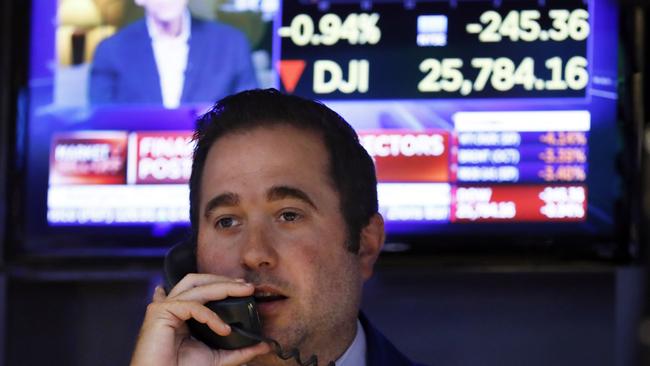
6.25am: Gold above $US1500
The price of gold briefly rose above $1500 per ounce, a key level last breached six years ago, as investors sought shelter from the fallout of a raging US-China trade war.
At about 13.35 GMT, gold jumped to $US1500.25 per ounce, the highest point since April 2013 and 1.7 per cent higher than late Tuesday.
AFP
6.20am: Trump: Fed cuts must be ‘bigger and faster’
US President Donald Trump continued to hammer the Federal Reserve, demanding more stimulus to boost the economy as the 2020 elections approach.
And as Wall Street looked set to tumble on economic fears, which sent bond yields tumbling in Europe and the US, Trump said the Fed, not China, is America’s main economic obstacle.
“They must cut rates bigger and faster and stop their ridiculous quantitative tightening NOW,” he said on Twitter, just a week after the US central bank cut the benchmark lending rate for the first time in more than a decade.
AFP
“Three more Central Banks cut rates.†Our problem is not China - We are stronger than ever, money is pouring into the U.S. while China is losing companies by the thousands to other countries, and their currency is under siege - Our problem is a Federal Reserve that is too.....
— Donald J. Trump (@realDonaldTrump) August 7, 2019
....terrible thing to watch, especially when things could be taken care of sooo easily. We will WIN anyway, but it would be much easier if the Fed understood, which they don’t, that we are competing against other countries, all of whom want to do well at our expense!
— Donald J. Trump (@realDonaldTrump) August 7, 2019
6.18am: Policymakers scramble as trade war widens
Longstanding warnings from economists of global spillover from the US-China trade war appear to be materialising, with a trio of central banks springing surprise rate cuts on Wednesday and bond markets in retreat.
The bold monetary policy moves in India, New Zealand and Thailand came as industrial production in European powerhouse Germany fell back in June, adding to uncertainty in the eurozone compounded by the trade war.
US President Donald Trump has threatened to slap additional tariffs on Chinese imports, and China has now let its yuan currency fall through 7.0 against the dollar.
Trump, in a series of outbursts on Twitter, has demanded the Fed reply in kind even after the US central bank staged its first-rate cut in a decade last week.
“’Three more Central Banks cut rates.’ Our problem is not China...” he tweeted, attacking the Fed anew.
The Trump administration accuses Beijing of foreign exchange manipulation, fuelling fears of a currency war in addition to the trade battles.
AFP
6.15am: Glencore to close key cobalt mine
Mining giant Glencore posted a sharp fall in first half profits and confirmed the temporary closure at a major cobalt mine in the Democratic Republic of Congo.
The production halt at the Mutanda project in DRC’s southern Katanga province came in response to the mine’s “reduced economic viability,” as prices for the battery metal fell, Glencore chief executive Ivan Glasenberg said in a statement.
Overall, Glencore’s profits through the first half of 2019 were down 92 per cent compared with the same period last year.
“Our performance in the first half reflected a challenging economic backdrop for our commodity mix,” Glasenberg said.
Global trade tensions, notably tariff battles between the United States and China, have heightened concerns about manufacturing output.
But Glasenberg voiced confidence that “commodities fundamentals will move in (Glencore’s) favour.
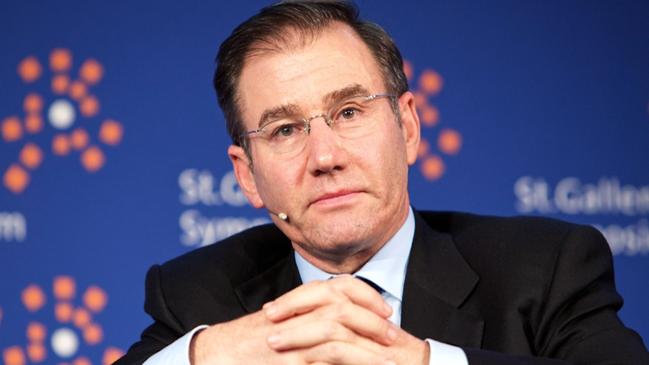
AFP
6.12am: Twitter reveals unauthorised data use
The social network Twitter said overnight that users’ personal data had been used for advertising purposes, without their consent and despite dedicated settings to counteract such events.
A Twitter statement said the fault was corrected Monday and that an investigation was being conducted to determine how many people had been affected, while advising users to verify their data sharing settings.
The situation involved two cases, the first one arising if users clicked or viewed an advertisement for a mobile application and then interacted with it since May 2018.
The second case involved Twitter showing people ads “based on inferences we made about the devices you use, even if you did not give us permission to do so,” it added.
AFP
6.10am: Commerzbank sees uphill struggle
Germany’s second-biggest lender Commerzbank said second-quarter profits were steady, but cautioned that any increase in the full-year bottom line looked increasingly out of reach.
Net profit at the Frankfurt-based firm shrank 0.3 per cent, to 271 million euros ($US304 million), beating forecasts from analysts surveyed by Factset.
Revenues fell back 2.2 per cent, to 2.1 billion euros, even as Commerzbank succeeded in boosting turnover from interest-bearing products as it continued to add customers.
The bank has gained 1.3 million customers since 2016, “an important factor in mitigating the effects of the negative interestrate environment, low margins in the competitive German banking market and the restrictive regulatory situation,” CFO Stephan Engels told reporters.
Looking ahead to the full year, the bank expects “higher underlying revenues” compared with 2018’s 8.6 billion euros and “a slight increase in consolidated net-income” from 865 million euros last year, it said in a statement.
AFP

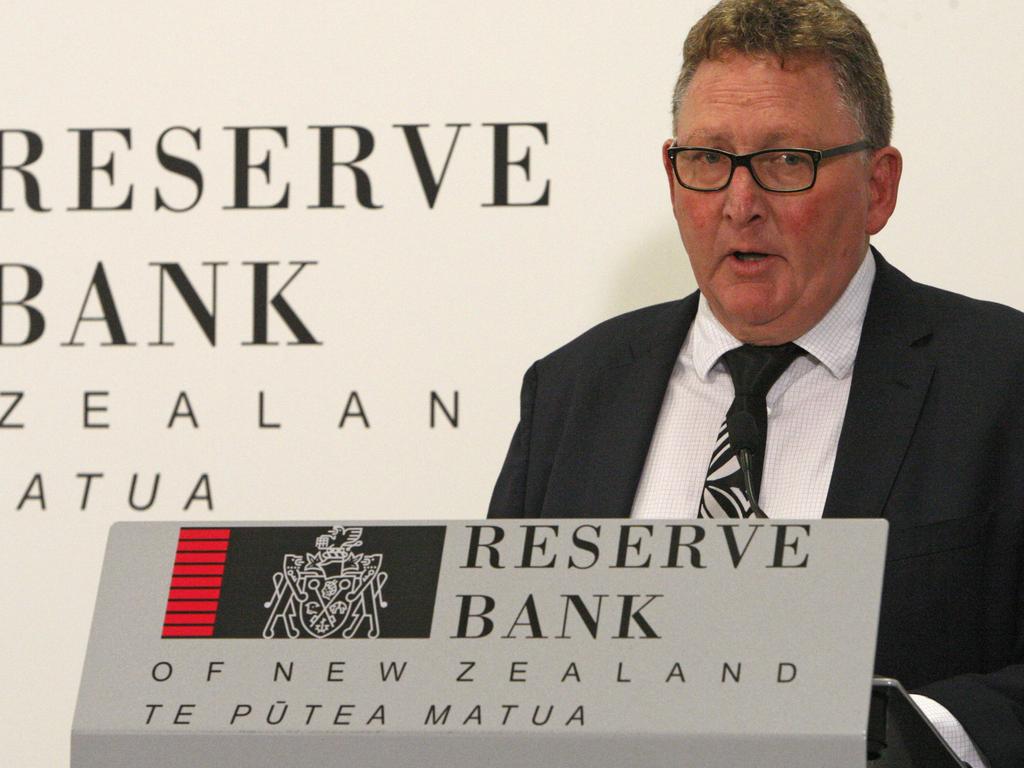


To join the conversation, please log in. Don't have an account? Register
Join the conversation, you are commenting as Logout